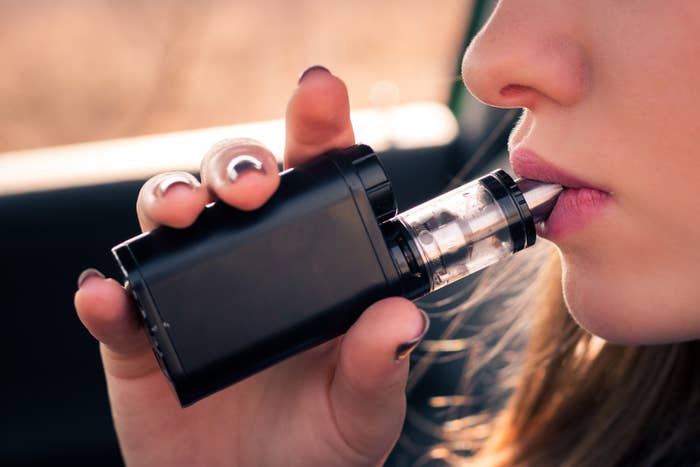
E-cigarettes are often touted as a safer alternative to traditional cigarettes, but a Pennsylvania teenager has been diagnosed with the first reported case of a serious lung problem that may have been caused by vaping. While experts can't confirm that her condition was definitely due to vaping, they believe it's the most likely explanation.
The 18-year-old Pennsylvania woman developed hypersensitivity pneumonitis — also known as "wet lung" — after just three weeks of using an e-cigarette, according to a case study that was published this week in the medical journal Pediatrics. The woman's name was withheld for privacy.
The condition was so serious that she had respiratory failure and was intubated, which means a ventilator was needed to help her breathe because she wasn't getting enough oxygen.
The teen first went to the emergency room at the University of Pittsburgh Medical Center last year because she had symptoms like shortness of breath, coughing, and an intense, stabbing chest pain when breathing in and out. She didn't have a fever or a runny, stuffy nose, which helped doctors rule out a respiratory infection like the flu.
"The ultimate diagnosis was hypersensitivity pneumonitis — 'pneumonitis' means inflammation of the lung, 'hypersensitivity' means due to an overreaction by the body’s immune system to something," study coauthor Dr. Daniel J. Weiner told BuzzFeed News. Weiner, the medical director of the Pulmonary Function Laboratory at the Children’s Hospital of Pittsburgh, consulted on the patient's care.
The woman was treated with steroids, and in addition to the respirator, needed to have tubes inserted to drain the fluid from her lungs.
She'd only had mild asthma in the past and had recently started using an e-cigarette, leading doctors to conclude that vaping was the most likely cause of the inflammation. Testing also showed the inflammation wasn't due to bacteria, a fungus, or a virus.
"We cannot prove beyond any doubt that it was due to an e-cigarette," said Weiner, but added the "development of her symptoms around the same time she started using an e-cigarette allowed us to conclude that was the cause."
Because vaping is such a new technology, little is known about its long-term effects on the body. Some research suggests that it can damage mouth cells similar to the way tobacco use does. Some types of e-juice — the liquid that is turned into a vapor and usually contains nicotine and flavorings — have been found to contain a chemical called diacetyl, which is known to cause bronchiolitis obliterans, or popcorn lung.
This serious and irreversible lung condition is called popcorn lung because it has been diagnosed in workers in plants that manufacture microwaveable popcorn. Although diacetyl is no longer found in most microwave popcorn products, it can be found in some vape juices. In 2015, Harvard researchers tested 51 products and found it in 75% of the flavored electronic cigarettes and refill fluids they tested.
"In addition to the chemicals in e-cigarettes and other vaping products, there is the chance for thermal (heat) injury to the airway linings," said Weiner. "Many folks have focused primarily on the risks of cancer from chemicals, but these kind of injuries as experienced by this young lady are also life-threatening."
The lack of research has medical experts particularly alarmed about how popular vaping is among teenagers. E-cigarette use among high school students increased by 900% between 2011 and 2015, according to a report from the Surgeon General. Although some people use e-cigarettes as a replacement for tobacco, there's also numbers to suggest that people who've never smoked at all are picking up vaping.
"The most important warning is that patients should not inhale anything into their lungs that is not air, oxygen, or a medication prescribed by their doctor," said Weiner.
